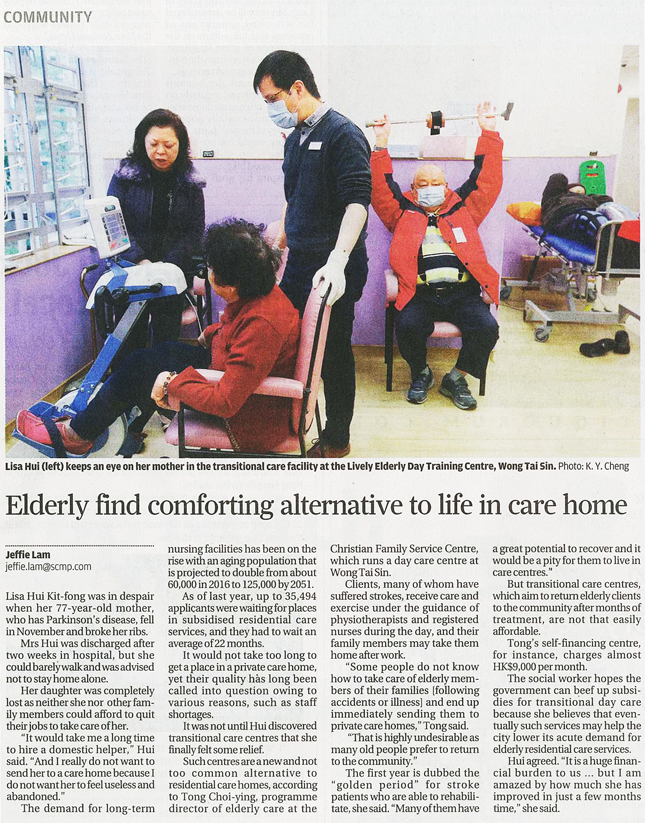過往活動
Media Coverage: Elderly find comforting alternative to life in care home
2017/01/16
| Date: | 16th January, 2017 (Monday) |
| Source: | South China Morning Post – City |
| Re: | Elderly find comforting alternative to life in care home |
| Youtube: | Please Click Here |
| Ref: | Please Click Here |
Lisa Hui Kit-fong was in despair when her 77-year-old mother, who has Parkinson's disease, fell in November and broke her ribs.
Mrs Hui was discharged after two weeks in hospital, but she could barely walk and was advised not to stay home alone.
Her daughter was completely lost as neither she nor other family members could afford to quit their jobs to take care of her.
"It would take me a long time to hire a domestic helper," Hui said. "And I really do not want to send her to a care home because I do not want her to feel useless and abandoned."
The demand for long-term nursing facilities has been on the rise with an aging population that is projected to double from about 60,000 in 2016 to 125,000 by 2051.
As of last year, up to 35,494 applicants were waiting for places in subsidised residential care services, and they had to wait an average of 22 months.
It would not take too long to get a place in a private care home, yet their quality has long been called into question owing to various reasons, such as staff shortages.
It was not until Hui discovered transitional care centres that she finally felt some relief.
Such centres are a new and not too common alternative to residential care homes, according to Tong Choi-ying, programme director of elderly care at the Christian Family Service Centre, which runs a day care centre at Wong Tai Sin.
Clients, many of whom have suffered strokes, receive care and exercise under the guidance of physiotherapists and registered nurses during the day, and their family members may take them home after work.
"Some people do not know how to take care of elderly members of their families [following accidents or illness] and end up immediately sending them to private care homes," Tong said.
"That is highly undesirable as many old people prefer to return to the community."
The first year is dubbed the "golden period" for stroke patients who are able to rehabilitate, she said. "Many of them have a great potential to recover and it would be a pity for them to live in care centres."
But transitional care centres, which aim to return elderly clients to the community after months of treatment, are not that easily affordable.
Tong's self-financing centre, for instance, charges almost HK$9,000 per month.
The social worker hopes the government can beef up subsidies for transitional day care because she believes that eventually such services may help the city lower its acute demand for elderly residential care services.
Hui agreed. "It is a huge financial burden to us ... but I am amazed by how much she has improved in just a few months time," she said.


